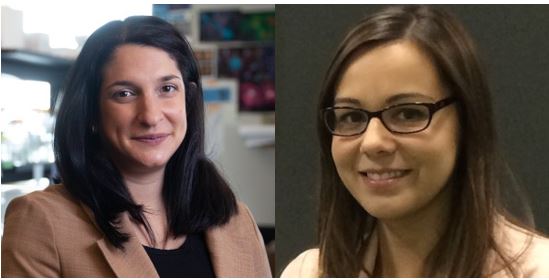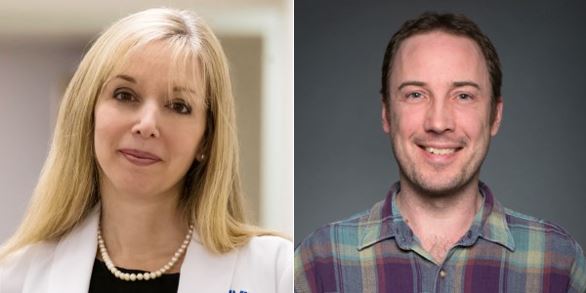The Ottawa Hospital’s Research Institute is awarding four ELEVATE seed grants to help researchers launch new ideas and collaborations.
The grants, worth a total of $198,000, will advance research on muscle disease, stroke, ovarian cancer and scleroderma. They were selected after a rigorous review by a panel of internal and external researchers as well as patient partners.
ELEVATE is funded in part by undesignated gifts to The Ottawa Hospital’s Research through The Ottawa Hospital Foundation.
Research project lay summaries:
How does endometriosis become ovarian cancer?
 Drs. Sukhbir (Sony) Singh and David CookDrs. David Cook and Sukhbir (Sony) Singh are investigating why some people with endometriosis develop ovarian cancer while most do not. Endometriosis happens when tissue similar to the lining of the uterus grows outside the uterus, causing pain and infertility. If this tissue attaches to the ovaries, it can increase the risk of ovarian cancer by 10 times. However, only some cases of endometriosis on the ovaries will ever become ovarian cancer. The research team will use cutting-edge technology to understand why this is. They will study ovarian tissue samples from patients with endometriosis, aiming to uncover changes in the immune system and cellular environment that might allow cancer to develop. This research could lead to better ways to predict, prevent, and treat ovarian cancer in people with endometriosis. Additionally, the team will establish a new biobank of gynecologic diseases to support ongoing and future research.
Drs. Sukhbir (Sony) Singh and David CookDrs. David Cook and Sukhbir (Sony) Singh are investigating why some people with endometriosis develop ovarian cancer while most do not. Endometriosis happens when tissue similar to the lining of the uterus grows outside the uterus, causing pain and infertility. If this tissue attaches to the ovaries, it can increase the risk of ovarian cancer by 10 times. However, only some cases of endometriosis on the ovaries will ever become ovarian cancer. The research team will use cutting-edge technology to understand why this is. They will study ovarian tissue samples from patients with endometriosis, aiming to uncover changes in the immune system and cellular environment that might allow cancer to develop. This research could lead to better ways to predict, prevent, and treat ovarian cancer in people with endometriosis. Additionally, the team will establish a new biobank of gynecologic diseases to support ongoing and future research.
Co-PIs: David Cook (Cancer Research), Sukhbir (Sony) Singh (Acute Care Research)
Research Team: Sarah Nersesian, Maryam Echaibi, Teresa Flaxman, Edita Delic, Aurelia Busca
What are the barriers and enablers to a CAR-T trial for scleroderma?
 Drs. Natasha Kekre and Nancy Maltez Drs. Nancy Maltez and Natasha Kekre are aiming to expand treatment options for patients with systemic scleroderma, a rare autoimmune disease that causes the skin and organs to harden. Currently, the most effective treatment involves resetting the immune system through chemotherapy and stem cell transplants. However, this option can be associated with severe side-effects and the risk of symptom recurrence. The Canadian Led Immunotherapies in Cancer research program has pioneered a successful made-in-Canada CAR-T cell therapy for treating certain kinds of blood cancer. Now, the team hopes to explore its potential in treating scleroderma. To prepare for a clinical trial comparing stem cell transplantation to CAR-T therapy, the team will interview scleroderma patients and health-care providers to identify the barriers and enablers to patient referral and recruitment. Based on these insights, they will create tailored strategies to improve patient education, access, and participation in future trials, ultimately providing more patients with the opportunity to benefit from innovative treatments.
Drs. Natasha Kekre and Nancy Maltez Drs. Nancy Maltez and Natasha Kekre are aiming to expand treatment options for patients with systemic scleroderma, a rare autoimmune disease that causes the skin and organs to harden. Currently, the most effective treatment involves resetting the immune system through chemotherapy and stem cell transplants. However, this option can be associated with severe side-effects and the risk of symptom recurrence. The Canadian Led Immunotherapies in Cancer research program has pioneered a successful made-in-Canada CAR-T cell therapy for treating certain kinds of blood cancer. Now, the team hopes to explore its potential in treating scleroderma. To prepare for a clinical trial comparing stem cell transplantation to CAR-T therapy, the team will interview scleroderma patients and health-care providers to identify the barriers and enablers to patient referral and recruitment. Based on these insights, they will create tailored strategies to improve patient education, access, and participation in future trials, ultimately providing more patients with the opportunity to benefit from innovative treatments.
Co-PIs: Nancy Maltez (Inflammation and Chronic Disease), Natasha Kekre (Cancer Research)
Research Team: Justin Presseau, Kednapa Thavorn
What can MRI, AI and proteins say about muscle disease progression?
 Drs. Jodi Warman Chardon and Ted PerkinsDrs. Jodi Warman Chardon and Ted Perkins are launching groundbreaking research to help with the development of new treatments for Inclusion Body Myositis (IBM). This progressive muscle disease impacts swallowing and mobility by causing weakness in the muscles of the face, throat, and limbs. By using advanced MRI techniques and blood protein analysis, the team aims to identify new biomarkers that can quickly tell how patients in clinical trials are responding to new therapies. The team’s innovative approach combines detailed imaging and cutting-edge AI machine learning to provide clearer insights into IBM's progression. The study not only paves the way for better IBM diagnosis and measurement but also sets a foundation for studying other muscle diseases. By fostering collaboration between clinical and data scientists, this research promises to enhance health care for patients with rare muscle disorders and lead to more effective treatments in the future.
Drs. Jodi Warman Chardon and Ted PerkinsDrs. Jodi Warman Chardon and Ted Perkins are launching groundbreaking research to help with the development of new treatments for Inclusion Body Myositis (IBM). This progressive muscle disease impacts swallowing and mobility by causing weakness in the muscles of the face, throat, and limbs. By using advanced MRI techniques and blood protein analysis, the team aims to identify new biomarkers that can quickly tell how patients in clinical trials are responding to new therapies. The team’s innovative approach combines detailed imaging and cutting-edge AI machine learning to provide clearer insights into IBM's progression. The study not only paves the way for better IBM diagnosis and measurement but also sets a foundation for studying other muscle diseases. By fostering collaboration between clinical and data scientists, this research promises to enhance health care for patients with rare muscle disorders and lead to more effective treatments in the future.
Co-PIs: Jodi Warman-Chardon (Neuroscience), Ted Perkins (Regenerative Medicine)
Research Team and Co-Investigators: Marcos Sampaio, Gerd Melkus, Ian Smith, Tanay Satarkar
Can a blood test help tailor stroke treatment?
 Drs. Vignan Yogendrakumar and Yan XuDrs. Vignan Yogendrakumar and Yan Xu are exploring whether evaluating a patient's risk of bleeding and blood clots before stroke treatment can reduce their risk of complications. Stroke teams can pluck out a blood clot from the brain mechanically and/or by using clot-busting drugs. Knowing whether a patient is at risk of a second stroke or a deadly brain bleed after these treatments would significantly alter their treatment plan, but understanding a patient’s personalized risks remains a challenge. A test called the thrombin generation assay can predict a patient’s risk of clots or bleeding and gives more detailed information than standard tests. The research team wants to see if this test can help care teams decide on the best treatment plan, reduce risks, and improve recovery for stroke patients. This project could enhance stroke care and save lives by tailoring treatments to individual needs.
Drs. Vignan Yogendrakumar and Yan XuDrs. Vignan Yogendrakumar and Yan Xu are exploring whether evaluating a patient's risk of bleeding and blood clots before stroke treatment can reduce their risk of complications. Stroke teams can pluck out a blood clot from the brain mechanically and/or by using clot-busting drugs. Knowing whether a patient is at risk of a second stroke or a deadly brain bleed after these treatments would significantly alter their treatment plan, but understanding a patient’s personalized risks remains a challenge. A test called the thrombin generation assay can predict a patient’s risk of clots or bleeding and gives more detailed information than standard tests. The research team wants to see if this test can help care teams decide on the best treatment plan, reduce risks, and improve recovery for stroke patients. This project could enhance stroke care and save lives by tailoring treatments to individual needs.
Co-PIs: Vignan Yogendrakumar (Neuroscience), Yan Xu (Inflammation and Chronic Disease)
Research Team and Co-Investigators: Célina Decroux, Mireille Ouimet, Joseph Shaw, Brian Dewar, Michele Demetroff
The ELEVATE competition focuses on a different strategic theme each year. Members of OHRI can learn more on our internal website.
The Ottawa Hospital is a leading academic health, research and learning hospital proudly affiliated with the University of Ottawa and supported by The Ottawa Hospital Foundation.
